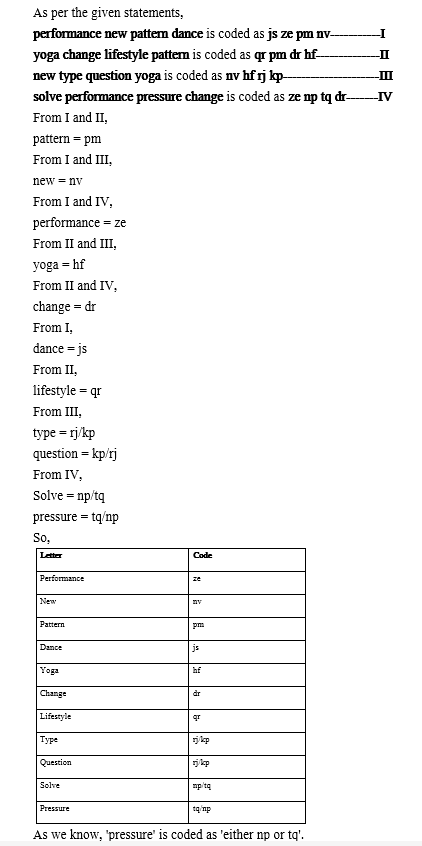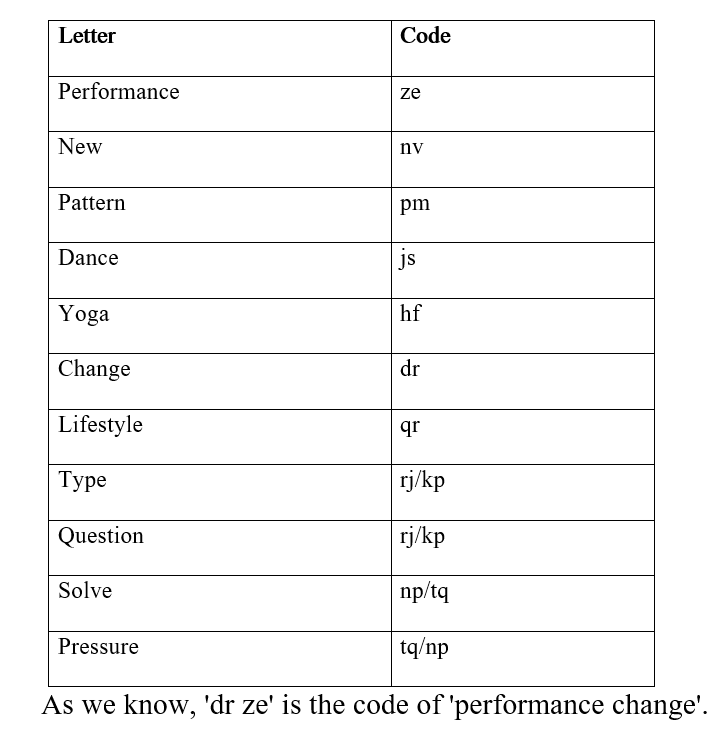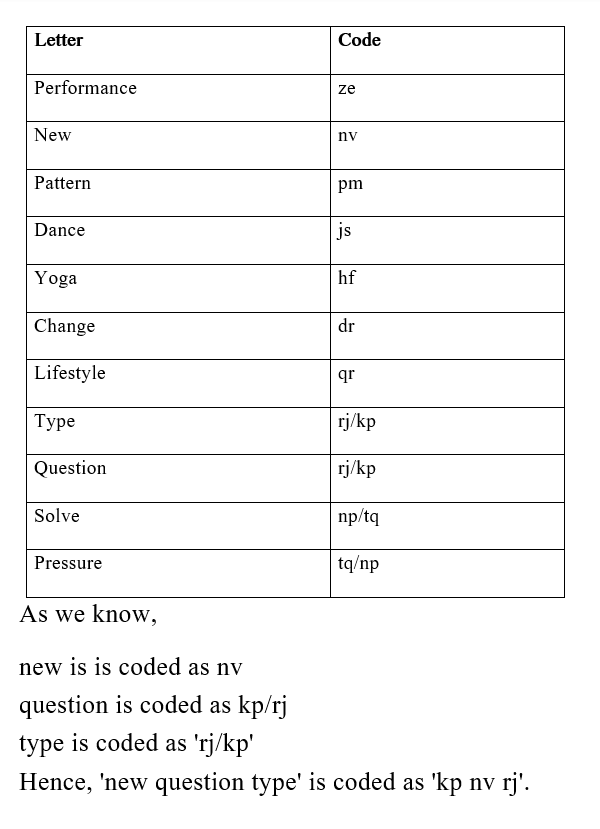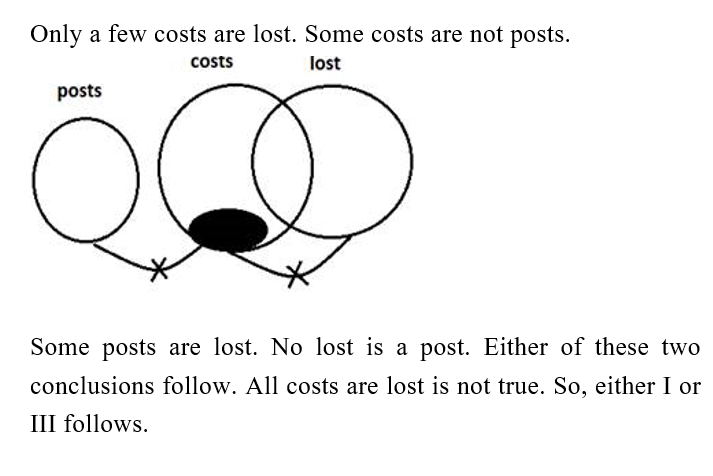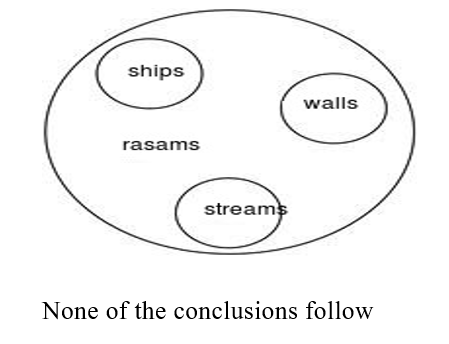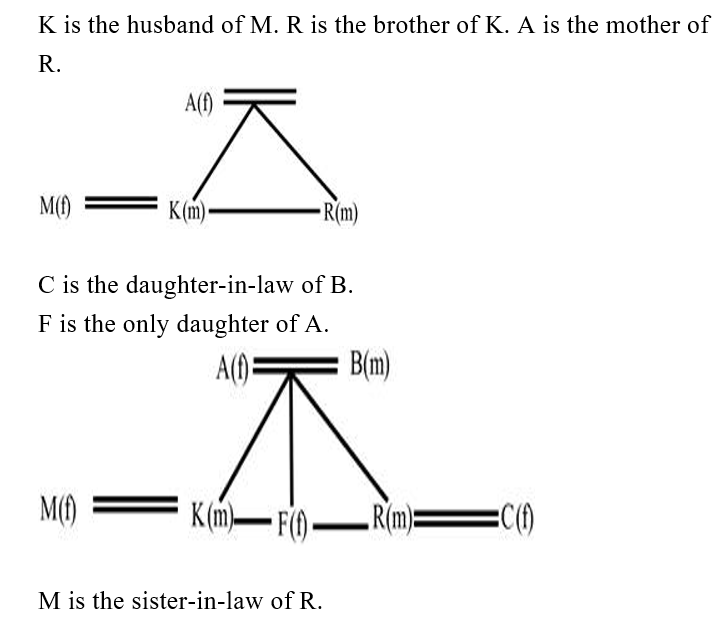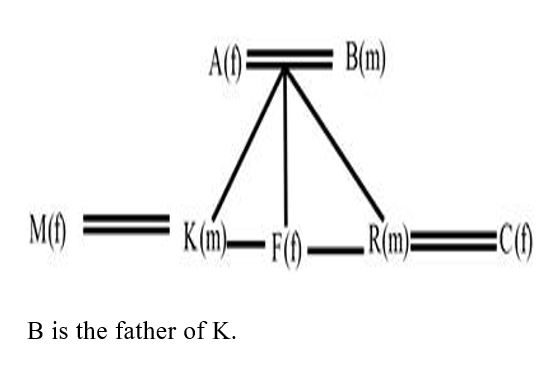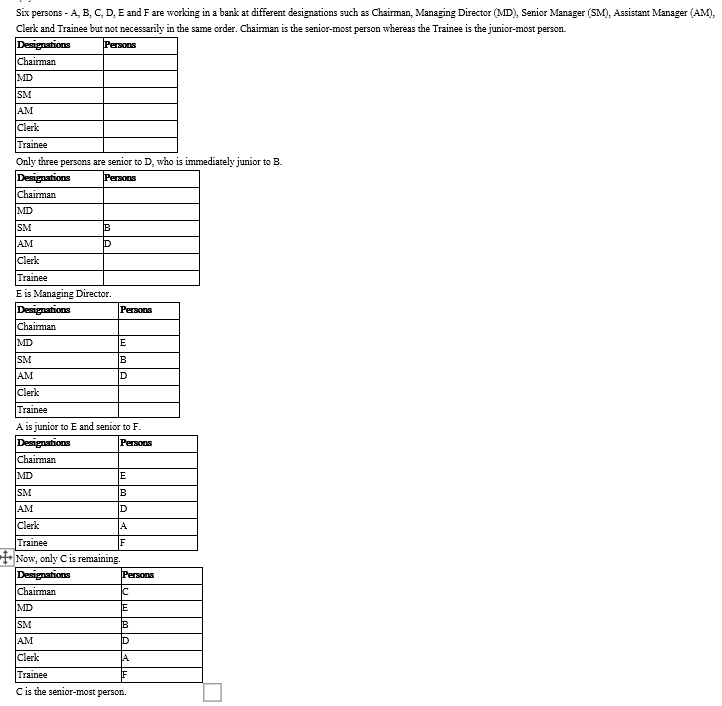Question 1:
Directions: Study the given information carefully and answer the questions below it:
निर्देश: दी गई जानकारी का ध्यानपूर्वक अध्ययन कीजिए और उसके नीचे दिए गए प्रश्नों के उत्तर दीजिए:
In a certain coded language some statements are coded as follow,
performance new pattern dance is coded as js ze pm nv
yoga change lifestyle pattern is coded as qr pm dr hf
new type question yoga is coded as nv hf rj kp
solve performance pressure change is coded as ze np tq dr
एक निश्चित कोडित भाषा में कुछ कथनों को इस प्रकार कोडित किया जाता है,
performance new pattern dance को js ze pm nv के रूप में कोडित किया जाता है।
yoga change lifestyle pattern को qr pm dr hf के रूप में कोडित किया जाता है।
new type question yoga को nv hf rj kp के रूप में कोडित किया जाता है।
solve performance pressure change को ze np tq dr के रूप में कोडित किया जाता है।
What is the code for 'pressure' in a certain coded language?
किसी निश्चित कोडित भाषा में 'pressure' के लिए कोड क्या है?
Question 2:
Directions: Study the given information carefully and answer the questions below it:
निर्देश: दी गई जानकारी का ध्यानपूर्वक अध्ययन कीजिए और उसके नीचे दिए गए प्रश्नों के उत्तर दीजिए:
In a certain coded language some statements are coded as follow,
performance new pattern dance is coded as js ze pm nv
yoga change lifestyle pattern is coded as qr pm dr hf
new type question yoga is coded as nv hf rj kp
solve performance pressure change is coded as ze np tq dr
एक निश्चित कोडित भाषा में कुछ कथनों को इस प्रकार कोडित किया जाता है,
performance new pattern dance को js ze pm nv के रूप में कोडित किया जाता है।
yoga change lifestyle pattern को qr pm dr hf के रूप में कोडित किया जाता है।
new type question yoga को nv hf rj kp के रूप में कोडित किया जाता है।
solve performance pressure change को ze np tq dr के रूप में कोडित किया जाता है।
The code 'dr ze' is the coded language of which of the following?
निम्नलिखित में से किस विकल्प का कोडित भाषा कोड 'dr ze' है?
Question 3:
Directions: Study the given information carefully and answer the questions below it:
निर्देश: दी गई जानकारी का ध्यानपूर्वक अध्ययन कीजिए और उसके नीचे दिए गए प्रश्नों के उत्तर दीजिए:
In a certain coded language some statements are coded as follow,
performance new pattern dance is coded as js ze pm nv
yoga change lifestyle pattern is coded as qr pm dr hf
new type question yoga is coded as nv hf rj kp
solve performance pressure change is coded as ze np tq dr
एक निश्चित कोडित भाषा में कुछ कथनों को इस प्रकार कोडित किया जाता है,
performance new pattern dance को js ze pm nv के रूप में कोडित किया जाता है।
yoga change lifestyle pattern को qr pm dr hf के रूप में कोडित किया जाता है।
new type question yoga को nv hf rj kp के रूप में कोडित किया जाता है।
solve performance pressure change को ze np tq dr के रूप में कोडित किया जाता है।
What is the code for 'new question type' in a certain coded language?
एक निश्चित कोडित भाषा में 'new question type' के लिए कोड क्या है?
Question 4:
Directions: Study the given information carefully and answer the questions below it:
निर्देश: दी गई जानकारी का ध्यानपूर्वक अध्ययन कीजिए और उसके नीचे दिए गए प्रश्नों के उत्तर दीजिए:
In a certain coded language some statements are coded as follow,
performance new pattern dance is coded as js ze pm nv
yoga change lifestyle pattern is coded as qr pm dr hf
new type question yoga is coded as nv hf rj kp
solve performance pressure change is coded as ze np tq dr
एक निश्चित कोडित भाषा में कुछ कथनों को इस प्रकार कोडित किया जाता है,
performance new pattern dance को js ze pm nv के रूप में कोडित किया जाता है।
yoga change lifestyle pattern को qr pm dr hf के रूप में कोडित किया जाता है।
new type question yoga को nv hf rj kp के रूप में कोडित किया जाता है।
solve performance pressure change को ze np tq dr के रूप में कोडित किया जाता है।
In the question given below, two statements are given followed by conclusions: I, II and III. You have to take the given statements to be true even if they seem to be at variance from commonly known facts. Read the conclusions and decide which of the given conclusions logically follows from the given statements disregarding commonly known facts
नीचे दिए गए प्रश्न में दो कथनों का अनुसरण करते हुए निष्कर्ष : I, II और III दिए गए हैं। आपको दिए गए कथनों को सत्य मानना है, भले ही वे आमतौर पर ज्ञात तथ्यों से भिन्न हों। निष्कर्षों का अध्ययन कीजिए और निर्धारित कीजिए कि दिए गए निष्कर्षों में से कौन-सा/से निष्कर्ष आमतौर पर ज्ञात तथ्यों की अवहेलना करते हुए दिए गए कथनों का तार्किक रूप से अनुसरण करता/ करते है/हैं।
Statements: कथनः
Only a few costs are lost. / केवल कुछ कॉस्ट, लॉस्ट हैं
Some costs are not posts. / कुछ कॉस्ट, पोस्ट नहीं हैं
Conclusions: निष्कर्षः
I. Some posts are lost. / I. कुछ पोस्ट, लॉस्ट हैं
II. All costs are lost. / II. सभी कॉस्ट, लॉस्ट हैं
III. No lost is a post. / III. कोई लॉस्ट, पोस्ट नहीं है
Question 5:
Directions: Study the given information carefully and answer the questions below it:
निर्देश: दी गई जानकारी का ध्यानपूर्वक अध्ययन कीजिए और उसके नीचे दिए गए प्रश्नों के उत्तर दीजिए:
In a certain coded language some statements are coded as follow,
performance new pattern dance is coded as js ze pm nv
yoga change lifestyle pattern is coded as qr pm dr hf
new type question yoga is coded as nv hf rj kp
solve performance pressure change is coded as ze np tq dr
एक निश्चित कोडित भाषा में कुछ कथनों को इस प्रकार कोडित किया जाता है,
performance new pattern dance को js ze pm nv के रूप में कोडित किया जाता है।
yoga change lifestyle pattern को qr pm dr hf के रूप में कोडित किया जाता है।
new type question yoga को nv hf rj kp के रूप में कोडित किया जाता है।
solve performance pressure change को ze np tq dr के रूप में कोडित किया जाता है।
In the question given below, three statements are given followed by two conclusions. You have to consider the given statements to be true even if they seem to be at variance from commonly known facts. Read the conclusions and decide which of the given conclusions logically follows from the given statements disregarding commonly known facts.
नीचे दिए गए प्रश्न में तीन कथन और उसके बाद दो निष्कर्ष दिए गए हैं। आपको दिए गए कथनों को सत्य मानना है, भले ही वे सर्वज्ञात तथ्यों से भिन्न प्रतीत होते हों। निष्कर्षों को पढ़िए और निर्धारित कीजिए कि दिए गए निष्कर्षों में से कौन-सा/से निष्कर्ष सामान्य रूप से ज्ञात तथ्यों की अवहेलना करते हुए दिए गए कथनों का तार्किक रूप से अनुसरण करता/करते है/हैं।
Statements: कथनः
All ships are rasams. / सभी शिप, रसम हैं।
All walls are rasams. / सभी वाल, रसम हैं।
All streams are rasams. / सभी स्ट्रीम, रसम हैं।
Conclusions: निष्कर्षः
I. Some walls are ships. / कुछ वाल, शिप हैं।
II. Some streams are ships. / कुछ स्ट्रीम, शिप हैं।
Question 6:
Directions: There are seven members in a family. Either both or none of the parents were alive. A is the mother of R. K is the husband of M. C is the daughter-in-law of B. F is the only daughter of A. R is the brother of K.
निर्देश : एक परिवार में सात सदस्य हैं। या तो माता-पिता दोनों जीवित हैं या दोनों में से कोई भी जीवित नहीं है। A, R की माता है। K, M का पति है। C, B की बहु है। F, A की इकलौती बेटी है। R, K का भाई है।
How is M related to R?
M, R से कैसे संबंधित है?
Question 7:
Directions: There are seven members in a family. Either both or none of the parents were alive. A is the mother of R. K is the husband of M. C is the daughter-in-law of B. F is the only daughter of A. R is the brother of K.
निर्देश : एक परिवार में सात सदस्य हैं। या तो माता-पिता दोनों जीवित हैं या दोनों में से कोई भी जीवित नहीं है। A, R की माता है। K, M का पति है। C, B की बहु है। F, A की इकलौती बेटी है। R, K का भाई है।
How is B related to K?
B, K से कैसे संबंधित है?
Question 8:
Six persons - A, B, C, D, E and F are working in a bank at different designations such as Chairman, Managing Director (MD), Senior Manager (SM), Assistant Manager (AM), Clerk and Trainee but not necessarily in the same order. Chairman is the senior-most person whereas the Trainee is the juniormost person. A is junior to E and senior to F. Only three persons are senior to D, who is immediately junior to B. E is Managing Director. Who among the following is the senior-most person?
छह व्यक्ति - A, B, C, D, E और F अलग-अलग पदों चेयरमैन, मैनेजिंग डायरेक्टर (MD), सीनियर मैनेजर (SM), असिस्टन्ट मैनेजर (AM), क्लर्क और ट्रेनी पर एक बैंक में कार्यरत हैं, लेकिन आवश्यक नहीं कि समान क्रम में हो। चेयरमैन वरिष्ठतम पद वाला व्यक्ति है जबकि ट्रेनी सबसे कनिष्ठतम पद वाला व्यक्ति है। A, E से कनिष्ठ और F से वरिष्ठ है। केवल तीन व्यक्ति D से वरिष्ठ हैं और D, B से ठीक कनिष्ठ है। E मैनेजिंग डायरेक्टर है। निम्नलिखित में से वरिष्ठतम पद वाला व्यक्ति कौन है?
Question 9:
In the question below, a statement is followed by two conclusions based on the statement. Study the conclusions and select the correct option as the answer.
नीचे दिए गए प्रश्न में एक कथन के बाद कथन पर आधारित दो निष्कर्ष दिए गए हैं। निष्कर्षों का अध्ययन कीजिए और उत्तर के रूप में सही विकल्प का चयन कीजिए।
Statement: / कथन:
F > P = T ≤ B = U ≥ Q; C = A ≤ T
Conclusion / निष्कर्षः
I. U ≥ C II. T ≤ Q
Question 10:
In the question relationship between different elements is shown in the statements. The statement is followed by two conclusions. Choose the correct option.
प्रश्न में विभिन्न तत्वों के बीच संबंध कथनों में दर्शाया गया है। कथन के बाद दो निष्कर्ष निकलते हैं। सही विकल्प चुनिए।
Statement: / कथनः
P > T < V, J < T ≥ S
Conclusion: / निष्कर्षः
I. P>S II. J<V

